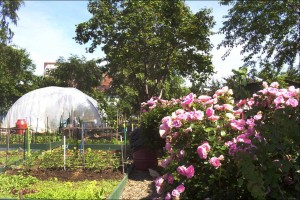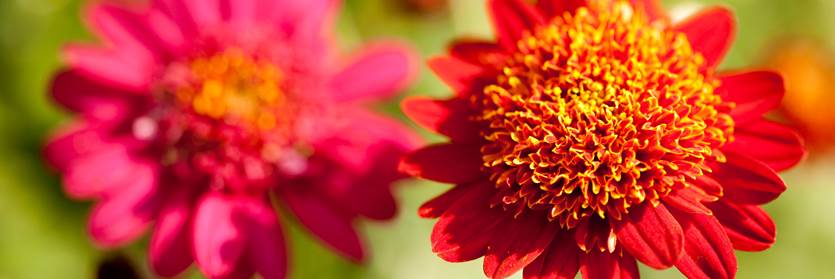Community Gardener’s Passion Keeps Growing
Posted in Exhibitions, People, The Edible Garden on September 10 2009, by Plant Talk
Bronx Green-Up Tours, Harvest Fair on Tap this Weekend
 |
Karen Washington is a community gardener and activist. As part of The Edible Garden final weekend, she will lead a tour of the Garden of Happiness. |
 When I was 8 years old I used to watch the farm report before Saturday morning cartoons and wish and hope that one day I’d have my own farm.
When I was 8 years old I used to watch the farm report before Saturday morning cartoons and wish and hope that one day I’d have my own farm.
And now, in a way, I do. It may not be what some might think of as a traditional farm, but it’s the closest thing possible: a community garden.
I turned my passion for gardening into community gardening and activism—they go hand-in-hand—over 20 years ago. I want people to be aware that they can grow their own food wherever they are. I live in a low-income neighborhood, and I help educate people to go back to the land, because our grandparents and great-grandparents did not go to a supermarket or grocery store to buy their food; they grew it themselves.
The interest in community gardening has grown in recent years as people are starting to connect their health issues with not knowing where their food comes from. Child obesity—I mean diabetes at the age of 12 or 13!—wasn’t happening to our grandparents or great-grandparents. So now the younger generation is really sitting down and speaking to their elders and having that conversation. And with over 600 community gardens in New York City that you can join for free, the combination creates an atmosphere for people to really want to grow their own food.
At my garden—I belong to the Garden of Happiness on Prospect Avenue between East 181st and 182nd Streets in the Bronx—we have 30 families. Each is assigned a specific plot—the plot can be 5 by 6 feet, 10 by 15 feet—to grow what they want. The Botanical Garden’s Bronx Green-Up program and the NYC Department of Parks & Recreation’s GreenThumb program supply us with lumber for raised beds, tools, plants, seeds, soil, and compost. We bring our sweat and our hard labor.
During harvest time, it’s like a family. People exchange different herbs and vegetables and then once a year we have this great celebration where we give back to the community. Come join us on September 12 for this year’s festival.
I have so much experience in community gardening now, but I didn’t have any experience in the beginning. Bronx Green-Up, which is celebrating its 21st year, has been a great help to us. I remember seeing this green truck coming to my garden when I was just starting out, and someone comes out of the truck with a pick and a shovel. I asked “Who are you people?” And he said, “We’re from The New York Botanical Garden; we’re helping gardeners turn empty lots into community gardens. And the rest is history. What a resource this group has been. They have helped so many gardeners start community gardens.
If you’re thinking about doing gardening, urban farming, or farming make it a collective action, get your friends and family involved because it’s so much fun. The community gardens are open to the public, so just walk in to your local garden, and if someone is there tell them you’d like to join. Sometimes there are openings, sometimes there’s a waiting list. But even so, anybody with a passion wanting to try to grow something can do container gardening. Bring your container to a community garden and say you want to be a part of it and ask them to teach you how to grow. We have excellent resources here in New York City in our elders. They have a wealth of information. They come from the South, they come from Latin American countries, from the Caribbean, from Europe. You name it. So we have a wealth of information that our elders are eager to pass along to the younger generation.
Now, as community gardeners, we’re trying to give back. We’re trying to educate other people about growing their own foods and starting community gardens. Not everyone wants to be a gardener, but you can be a supporter and educated consumer about where your food comes from, and that’s the message we really want to get out to people.

